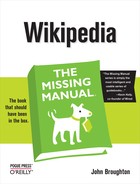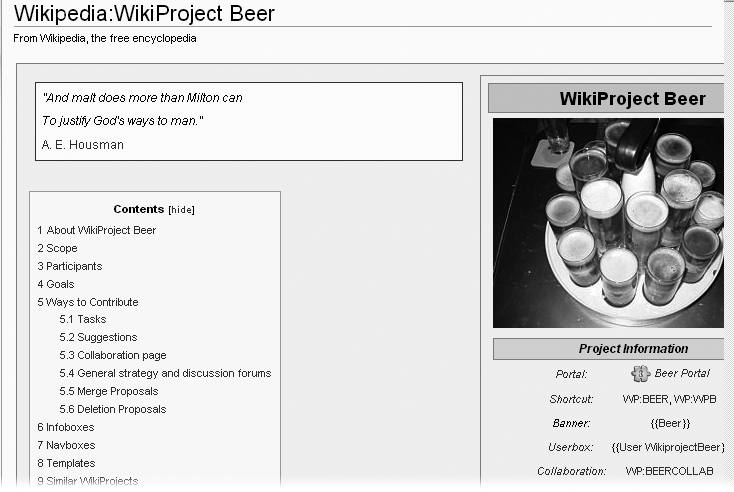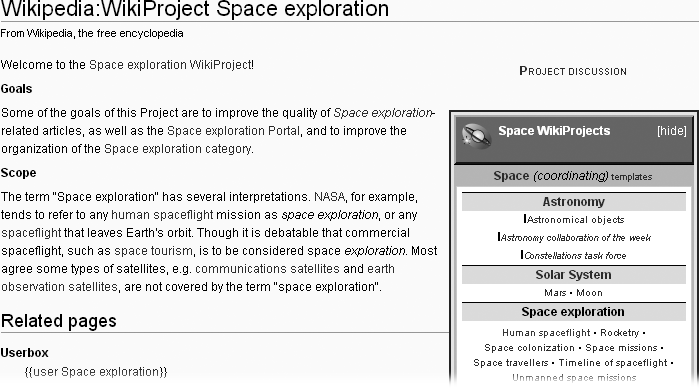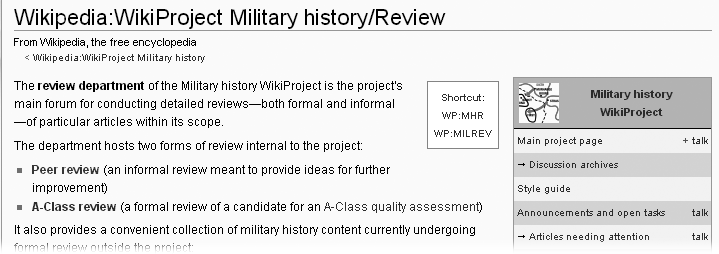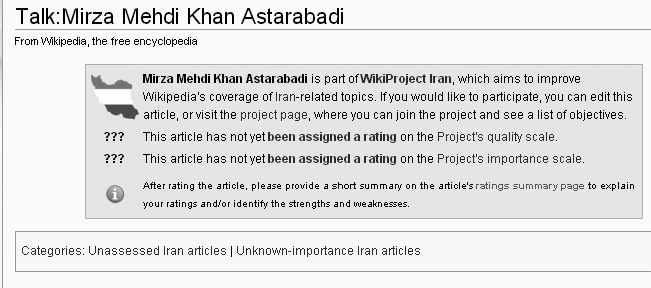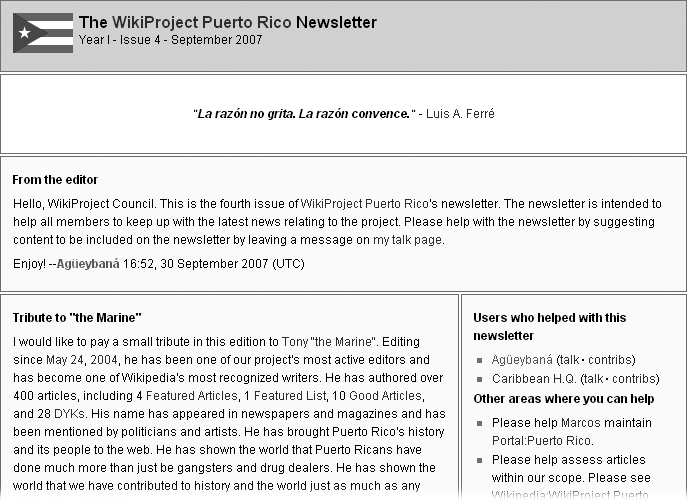Everything so far in this book has been about you as an individual editor, working on your own, interacting with others only to discuss problems or changes to articles. But editors at Wikipedia also work together in groups, formal or informal. Not only is there strength in numbers, there’s energy and fun. Such group work is one of the things that make Wikipedia as much an online community as it is an encyclopedia.
Most editors edit articles that particularly interest them: articles about television comedy shows; the region where they live; sports; areas of science or technology; history; multiplayer video games; and so on. If you’re one of them, the next natural step is joining a topical area WikiProject—a group of editors working on a collection of articles related to the same topic. Or you may take pleasure in a specific kind of editing: fixing footnotes; improving lead paragraphs; or adding geographical coordinates to articles. There are also WikiProjects for editors with such interests.
Although working in WikiProjects is the most common kind of group effort in Wikipedia, there are others: Collaborations are where a group of editors works on a single article for a week, fortnight, or month, and then turns to the next article they choose, often within a broad topical area. Organizations are less formal and less numerous than WikiProjects. One-time initiatives form and end whenever editors see the need and other editors agree to help.
This chapter describes each of these group efforts, and shows you where to get more information about the groups that already exist. And if you don’t find a group that covers something you’re interested in, this chapter also tells you how to create a group focused on your interest.
There are basically two types of WikiProjects—topical ones that focus on a subset of articles in a particular area (like WikiProject Poker), and cross-cutting ones that could theoretically work on any article in Wikipedia (like WikiProject League of Copyeditors).
In all, there are over a thousand WikiProjects (there’s no official count), of which about a third are labeled inactive. Over 80 percent of all WikiProjects are topical; the rest are cross-cutting.
WikiProjects that focus on a subset of Wikipedia articles are listed in the main directory, which you’ll find at the page Wikipedia:WikiProject Council/Directory (shortcut: WP:PROJDIR). Four major subdirectories are linked to from there:
Culture and the arts (for example, WikiProject Beer, WikiProject Discworld) (See Figure 9-1)
Geographical (for example, WikiProject British and Irish hills, WikiProject California)
History and society (for example, WikiProject Military history, WikiProject Universities)
Science, technology, and engineering (for example, WikiProject Carnivorous plants, WikiProject Linux)
Each of the four major groupings has hundreds of different WikiProjects in it, but there are definitely gaps—that is, opportunities for additional WikiProjects. That’s because there isn’t any person or group at Wikipedia responsible for top-down organizing: Every WikiProject that exists is the result of individual editors deciding that they wanted to create it.
Often topical WikiProjects are coordinated with each other when there’s potential overlap. Figure 9-2 shows an example.
There are 150 or so cross-cutting WikiProjects that focus on Wikipedia-wide issues, rather than on a subset of articles in a particular topical area. Most of these fit into two general categories:
Article focused. Deal with things like categories, citation cleanup, counter-vandalism, illustrations, image monitoring, lists, maps, neutrality in articles, and spam fighting, to list just a few. Such tasks are often described as maintenance, though much of their work is focused on enhancing articles rather than fixing mistakes.
Process and editor focused. Devoted to awards to editors, the closing of deletion discussions, improving database analysis, improving user pages, and so on.
And then there are the more or less one-of-a-kind WikiProjects, such as:
Wikipedia:WikiProject Classroom coordination. Covers “all formal educational assignments to edit Wikipedia articles including primary, secondary, and university level classes” (to quote from the project’s main page).
Wikipedia:Scientific peer review. Its goal is to “offer a high-calibre, content-oriented critique of articles on scientific subjects.”
Wikipedia:WikiProject Usability. Promotes “the application of standards related to usability and/or Web usability.”
Wikipedia:WikiProject Wikipedians against censorship. Coordinates efforts to oppose what members consider censorship of Wikipedia articles.
Cross-cutting WikiProjects are not just places to do types of work you enjoy, but they’re also excellent places to discuss the finer nuances of article construction and how to get the most out of Wikipedia’s powerful software tools. If you find a chapter of this book particularly interesting, and want to improve Wikipedia by working in that area, you’ll probably find a matching WikiProject. (If not, consider creating one, as described on Creating a New WikiProject.)
An August 2007 survey of random 100 articles found that more than half had a related WikiProject noted on their article talk page. Thirteen of those article talk pages had two or three associated WikiProjects, not just one. The good news: WikiProjects are important. More than half of articles in Wikipedia have at least one WikiProject interested in improving them. The bad news: Almost half of all articles in Wikipedia are WikiProject orphans—either outside of any existing WikiProject’s scope, or undiscovered by the relevant WikiProject.
There’s more evidence of the pervasiveness of WikiProjects: Statistics on all Wikipedia articles, as of July 2008, showed that almost 1.4 million articles had been assessed for quality by WikiProjects (assessments range from stub to featured article), with another 300,000 or so still to be assessed.
Looking at the examples on Cross-cutting WikiProjects, it’s clear that a WikiProject can aim to improve just about anything on Wikipedia. But the vast majority of WikiProjects focus on articles, and the majority of those focus on articles within a particular topical area. Understanding such WikiProjects will give you a good idea of WikiProjects as a whole.
The first and foremost goal of topical WikiProjects is to improve Wikipedia’s coverage of articles within that topic. Most of that effort is aimed at existing articles, but WikiProjects are also involved in creating new articles where needed.
WikiProjects are no more than the sum of the work of participating editors, so a certain amount of effort must be put into recruiting editors and retaining the interest of participating editors. (“Finding Other Participants and Encouraging Participation” on page Finding Other Participants and Encouraging Participation goes into more detail.)
A second role of WikiProjects is to maintain portals, mini-Main Pages which are entry points for particular topics. For example, WikiProject Indonesia maintains the page Portal:Indonesia (shortcut: P:ID) and WikiProject Books and WikiProject Novels jointly maintain the page Portal:Literature.
Note
If you want to search for text or information on a portal page, you need to modify your search to include the namespace Portal, because the normal Wikipedia search is only for information on article pages (pages in the Main namespace). You can do this by modifying your search on the Wikipedia search page by checking the box for the Portal namespace, after doing an initial search to get to the main search page. Another is to change your preferences (???) so that your searches automatically include both mainspace and portalspace.
A third WikiProjects role is to assess the quality of articles within their projects. As of October 2007, an estimated 800 WikiProjects had done assessments (quality of articles, importance of articles, and so on) within their topics. The Version 1.0 Editorial Team (shortcut: WP:1.0) uses these assessments to select articles, and in April 2007 released a collection of about 2,000 articles as Wikipedia version 0.5, on a set of CDs.
A WikiProject’s size significantly affects a given project’s activities. Some projects have hundreds of members and cover tens of thousands of articles; some have only a handful of members and less than a hundred articles. Task forces (or similar subgroupings) are critical for large projects, while small projects need to minimize administrative housekeeping, instead focusing on working on articles. Still, here are a few things that most projects can or should do:
Recruit editors to the project. Finding and retaining capable editors is necessary for any WikiProject to stay afloat.
Peer reviews, where an editor can submit an article for review by others. Peer reviews should be limited to articles that are reasonably well developed, since the primary problems with short articles—the lack of information and lack of sources—don’t require a peer review to point out.
Tagging articles that are within the project’s scope. Tagging—placing a WikiProject banner on article talk pages—can be done manually, but bots can help. Bots can use categories (Chapter 17) and keywords to tag articles talk pages, and they can create article lists for human review.
Picking a single article to improve enough for it to become a featured article, and maybe even appear on Wikipedia’s Main Page for a day. (There’s more detail on featured articles at WP:FA.) A featured article campaign is an excitement-generating way to kick off a WikiProject, though the process can take a month or two. And it’s important to pick an article for which sufficient sources exist so that it can achieve featured article quality.
Creating a list of needed articles within the project scope. (Page 78 lists some starting places to find articles identified as missing.)
Running a collaboration (weekly, monthly, or whenever) to try to focus the group on at least one article at a time. There’s more detail on collaborations on Collaborations.
If you’re a member of a WikiProject and hear of something interesting that your project isn’t doing, don’t be shy about suggesting it on the main talk page of that WikiProject or on another, more relevant talk page within that project. You may end up doing most of the initial work yourself, so avoid suggesting something you don’t have the time to work on alone or with one or two others. (If no one else is interested, it’s not a crime to drop the idea.)
One way to find a WikiProject you’d be interested in joining is to go to an article of personal interest and check the article’s talk page. If the article has a WikiProject banner, follow the link to that WikiProject, and see if you want to join.
The other way to find a WikiProject of interest is to use the page Wikipedia:WikiProject Council/Directory (shortcut: WP:PROJDIR). Start with one of the subdirectories, and drill down until you find something that looks interesting. Or if you see a gap where the WikiProject you’d like to join would be, consider starting a WikiProject yourself (Creating a New WikiProject).
Keeping a WikiProject going can be a challenge. After all, Wikipedia editors are unpaid volunteers whose interests and free time can change, so attrition is normal. Successful WikiProjects need to both recruit new members and retain the interest of existing members. If you’re in a WikiProject, it’s in your best interest to help with both of these.
You might think that recruitment and retention are the responsibility of whoever is in charge of a WikiProject. But the whole point of WikiProjects—and Wikipedia—is that no one’s in charge. The Wikipedia community strongly discourages voting, elected positions, and hierarchy; Wikipedia:What Wikipedia is not (shortcut: WP:NOT) clearly states that Wikipedia is neither a democracy nor a bureaucracy. (Some large WikiProjects have coordinators, but they’re primarily responsible for administrative housekeeping.)
So if, for example, your WikiProject doesn’t have a newsletter, and you want to write one, all you need to do is post to a talk page, saying that you’re thinking about doing so, asking if anyone has an objection—or wants to help. If no one objects, then you’re now the newsletter editor (or co-editor, if others are interested).
There are two standard ways to recruit new members for an ongoing WikiProject:
Putting WikiProject templates on article talk pages. Templates that mark articles as belonging to a given WikiProject always include a link to that project. Interested editors can click the link. Figure 9-4 shows an example.
Figure 9-4. This template for WikiProject Iran includes parameters (which would be visible in edit mode) for quality and importance. Because neither has yet been assessed, they show as “???” in the message box the template creates. Article assessments are important for a number of reasons, including identifying articles that might be included in published DVDs, and measuring Wikipedia’s progress.
Creating a userbox template (Creating Your User Page) for posting on member editors’ user pages. While user pages get fewer visits than article pages, an editor with similar interests may follow the userbox to the WikiProject page.
Figure 9-5. WikiProject Cycling has created two userboxes that participants can pick from, for posting on the user page. But they’ve also created or collected four userboxes for cycling enthusiasts who aren’t participants, perhaps a subtle way of encouraging editors to work on cycling articles, even if they’re not formal WikiProject members.
Less common methods include:
Posting a note on the article talk page of WikiProject articles. For example, say your group has worked formally on a particular article—more than the work of a single editor or a quick brush-up. Then you can write something like, “This article has just been substantially edited as part of the work of WikiProject Sea Monsters. If you have any questions about these edits, please contact us.”
Advertising. Yes, Wikipedia has advertising, at least internally, for WikiProjects and other good causes. To get your WikiProject into the loop of ads, see Template:Wikipedia ads/doc (shortcut: WP:BANNER).
Tip
To view the ads for yourself, put the template {{wikipedia ads}} onto your user page, or simply check out that template on a sandbox page.
Looking at the history of articles within a WikiProject to find non-members contributing something significant to an article. Then drop them a note on their user talk pages, inviting them to join the WikiProject. (This kind of note is a perfectly legitimate use of a user talk page.)
Making sure that your project’s entry in the WikiProject directory (shortcut: WP:PROJDIR) is complete. The brief description in the last column is particularly important for attracting potential editors.
Many WikiProjects have their own welcome template, which is ideal to post to the user talk pages of editors who sign up. If there’s no template, you can post a personal note. Making the new editor feel welcome helps encourage active participation.
A monthly newsletter updating editors on progress and plans can encourage editors to spend some time on the WikiProject. Mentioning new members by name is a great way to increase the enthusiasm level. If you want something more than a plain text newsletter, check out sample newsletters from a number of WikiProjects, collected at Wikipedia:WikiProject Council/Newsletters. (One sample is shown in Figure 9-6.)
Figure 9-6. The September 2007 newsletter for WikiProject Puerto Rico prominently mentions some editors who have contributed significantly to the WikiProject.
Tip
A number of bots automate the work of posting newsletters on individual user pages, including Anibot, EnewsBot, Newsletterbot, and StormBot. Simply post a request on one of the bot talk pages (User talk:Anibot, User talk:EnewsBot, or whatever).
An announcements page within the WikiProject can be a good way to encourage members to check in frequently. Just don’t hide the page away somewhere without putting up clear links to it.
Finally, while it may sound a bit hokey, at least a few WikiProjects have created awards for high participation editors. Having such an award posted on the editor’s user talk page is a pleasant surprise and provides reassurance that others in the group recognize the editor’s efforts.
If none of the thousand or so active WikiProjects focuses on a topic you’re interested in, you can take the initiative and start a new WikiProject. But you have a few steps in front of you. First, you should consider some alternatives. If you still want to start a whole new project, you need to develop a proposal, and if that gathers enough support, you can finally create a new page for your WikiProject.
Starting a new project from scratch may not be the only way to collaborate with others on the kind of work you want to do. Wikipedia:WikiProject Council/Guide (shortcut: WP:PROJGUIDE) offers guidance on alternatives to starting your own WikiProject. Here’s a quick summary:
Check to see if someone else has proposed a similar project in the past few months (the shortcut to the proposals page is WP:COUNCIL/P). If so, you can contact that editor and find out what’s happening.
If your topic is narrow enough, you can coordinate other editors via the talk (discussion) page of the main article of interest; for example, the page Talk:Tulip. Simply list (on that article talk page) the articles that need improving and ask other editors to work on them, or to let you know that they’re interested in doing so.
If the topic falls within an existing WikiProject, you can create a task force or work group within that WikiProject. This approach is easiest if the WikiProject already has a structure for and history of such smaller groups. Even if it doesn’t, the other editors may well be willing to try a pilot project.
If the topic falls partly in several existing WikiProjects, perhaps a parent/coordinating WikiProject might be the answer. This arrangement requires agreement by the existing WikiProjects, which may not be easy to get, but it’s worth a try.
If after considering the alternatives you decide that a separate WikiProject is still the right way to go, the next step is to post a proposal at Wikipedia:WikiProject Council/Proposals (shortcut: WP:COUNCIL/P). The proposal will stay up for 4 months, and then be archived if there isn’t sufficient support—a minimum of five to 10 active editors.
Don’t count on other editors just stumbling across the WikiProject. If it’s a cross-cutting project, it’s fine to post a note on the talk page of any relevant instructional pages (ones with a Wikipedia: prefix), and put a note at the proposals page of the Village Pump (shortcut: WP:VP/PR). If the proposed WikiProject is a subset of an existing WikiProject, then you also post something on the main talk page of that WikiProject.
Also, don’t be shy about posting notes on at least a few user talk pages, if you come across edits by others that indicate an interest in the topic (check their User contributions page). However, don’t post to dozens of random pages; that’s considered internal spamming.
If and when you’ve got sufficient indications of interest by other editors, go to Wikipedia:WikiProject Council/Guide/WikiProject for detailed instructions on starting a base page to launch your WikiProject. That page spells out all the steps for making the project a success: creating a template for article talk pages and a userbox for user pages, creating task lists, issuing newsletters, and so on.
